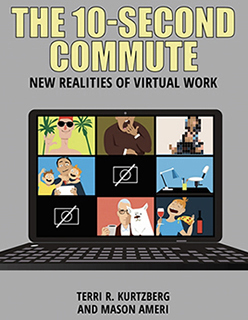
Navigating the remote work world
The work world will never be the same.
In a new book, Rutgers Business School professors Terri Kurtzberg and Mason Ameri explain all the ways technology transformed work when businesses and their employees transitioned to communicating, meeting, and getting their jobs done – primarily from home. “The 10-Second Commute: New Realities of Virtual Work” discusses the upside and downside of remote work culture and our individual experiences online, the emergence of the gig economy, and the explosion of jobs now being advertised as completely remote.
“The 10-Second Commute: New Realities of Virtual Work” discusses the upside and downside of remote work culture and our individual experiences online, the emergence of the gig economy, and the explosion of jobs now being advertised as completely remote.
Kurtzberg and Ameri, who have both done research in management and technology, provide rich insights in their book to help everyone – workers as well as managers – better understand how we work and how we can work better virtually. They share some of their thoughts below.
Q: Did the pandemic inspire you to write “The 10-Second Commute”?
Kurtzberg: “Ironically, this book was launched about two weeks before the pandemic sent everyone to work from home. But certainly, the fact that this became a front-and-center issue for everyone made it more meaningful and provided a rich environment to write about things as they were unfolding in real time. The need to shift our teaching online at a moment’s notice, for example, gave us lived experiences that prompted exploration into a broad range of topics.

As part of the book, we interviewed about a dozen people with expertise across a variety of fields (tech innovators, business owners, educators, lawyers, social workers, architects, etc.) and included their insights as well.”
Q: There was a realization during the pandemic about how advances in technology made working remotely possible, but what did your research show about the individual psychological impacts of this dependency on technology and the broader implications it has on society?
Ameri: “The technology market rose to the challenge and changed very rapidly to meet the need, while at the same time we learned to adjust ourselves and how we work and engage with other people through technology. We’ve also now had experience with the extremes – almost no virtual work and almost entirely virtual work – and found both lacking. Nonstop virtual work made it hard to shut down (burnout increased for many) and to find boundaries between work and home. In some ways, we’re at a crossroads right now, where we still need to figure out how to maintain a workplace culture and feel confident in our ability to measure productivity, even while stepping back from the traditional all-day, everyday work-in-the-office version. There has to be an interactive process between managers and employees to define exactly what the work is, in each job, and create an understanding of how they know when it’s been done well. This will help make clear what work needs to be done in person, with other people, and what can reasonably be done offline.”
Q: Can you talk about the ways people are maintaining work relationships online?
Kurtzberg: “It doesn’t seem like we’ve cracked this one yet. It’s hard to build trust online when you don’t know the other person already, and the attempts made by many organizations to formalize contact (required, round-robin moments to comment on your weekend before the meeting, for example) can fall flat. One point seems to have become clear: when it comes to getting to know other people and connecting with them, it’s far better to have conversations with only two or three people than in large groups.”
Q: How do people react to working from home?
Ameri: “Like all things, some people love it, and some people hate it. Many introverts felt like their time had finally come, where they could work in peace without needing to be cheerful all day and speaking over other people in meetings to be heard. There have also been some interesting findings in the past few years about how marginalized groups have been differently affected by the move to remote work.

On the plus side, it’s allowed unprecedented access to people with disabilities, whose employment numbers are on the rise. Statistics show that some racial minorities have also chosen to stay as work-from-home warriors, to avoid a day filled with microaggressions. The story when it comes to gender is more mixed – women seem to prefer working from home on the whole, to allow for more dual-role responsibilities to be attended to, but also seem to suffer more from carrying a heavier load on the home front and from being more overlooked when not in the office. But overall, it’s the rare employee that prefers to do the full 8-to-6 in the office five days a week at this point. As of today, there are 341,000 jobs on Indeed.com posted that offer remote work as an option, so it does seem like this is the new normal.”
Q: How is our language different with the move to remote work?
Kurtzberg: “It’s fascinating to see how many elements of our communication have changed with technology-mediated work. There are new gestures, like the way everyone waves at the end of a Zoom meeting, and new emoji to help put some emotional tone back into the stripped-down, words-only forms of written communication. There’s also the question of formality – an email can be anything from brief and chatty to as formal as a business letter. And then there’s the multi-communicating that happens, like the way people carry on sidebar chats via group or private messages during online meetings – it’s the new house of gossip.”
Q: What was the most surprising thing you uncovered working on the book?
Ameri: “The most surprising thing was how many aspects of our lives are touched by remote work. To do this topic justice, we had to talk about everything from the narrowest psychological experience (why do we get more exhausted when being on Zoom all day?) to how we need to dress and decorate our “Zoom rooms” to how the entire tech industry has responded to the challenge and the entire new markets and job segments that have been born out of our new technological capabilities, including the whole gig economy. Remote work is everywhere, and it’s not going away. It’s exciting to watch it develop and see how we master hybrid work, and the new forms of coordination it requires, going forward – we haven’t cracked this yet, but we’re learning as we go.”
Learn more about "The 10-Second Commute." Interested media may contact Susan Todd at stodd@business.rutgers.edu.
Press: For all media inquiries see our Media Kit


